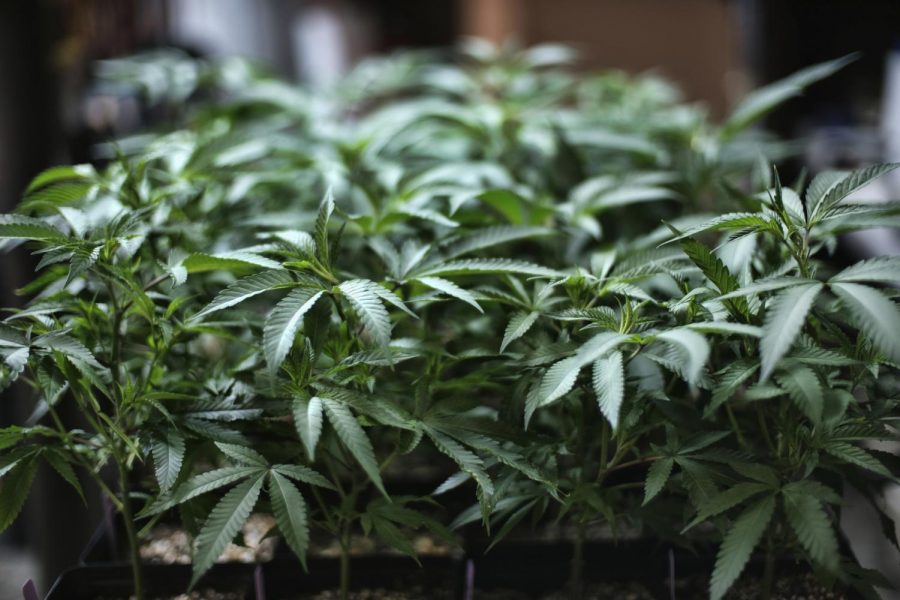Legalize it
(AP Photo/Richard Vogel, File)
In this Aug. 15, 2019 file photo, marijuana grows at an indoor cannabis farm in Gardena, Calif.
Dec 10, 2020
Did you know that the federal government classifies the drug marijuana as more dangerous than drugs like fentanyl and cocaine? It is classified as a “Schedule I” drug, which stands alongside drugs like heroin.
Last week, the U.S. House of Representatives passed legislation that would decriminalize marijuana, effectively removing the drug from the list of illegal substances under the Controlled Substances Act of 1970. This means that the issue of legalizing, decriminalizing or regulating marijuana would be left up to the states to decide. The bill was largely passed along party lines, 228-164, with strong Democratic support. It will almost undoubtedly die in the Senate with the Republican majority.
The only Republican to co-sponsor the legislation, Rep. Matt Gaetz of the Florida panhandle, claimed, “The federal government has lied to the people of this country about marijuana for a generation” and that the Republicans in Congress are getting this issue wrong. Gaetz is correct in both of his assessments.
According to Pew Research Center, as of November 2019, 91% of Americans believe that marijuana should be legalized either medically or recreationally. Of that overwhelming majority, just 32% believe it should only be legalized for medical use while the other 59% are in favor of recreational weed. Both Republican and Democratic voters produced a majority in favor of legalization, with 55% and 78% respectively.
For over a generation, our society has depicted marijuana through a demonizing lens. Our government has wasted billions of taxpayer dollars to fight the war on drugs, unnecessarily incarcerating thousands of Americans for nonviolent drug offenses. Why is this? We know that marijuana can be used to treat an array of medical issues, such as Alzheimer’s disease, epilepsy, cancer and glaucoma. We also know that this drug can be used to relieve pain and help those struggling with depression or anxiety.
Unfortunately, because the federal government continues to classify the drug as Schedule I, research is severely limited. While the government neglects to recognize the potential benefits of legalizing marijuana, another drug has been wreaking havoc on individuals and families for hundreds of years: alcohol.
The National Institute on Alcohol Abuse and Alcoholism reports that an estimated 95,000 Americans die from alcohol-related causes annually. The Centers for Disease Control and Prevention found that, of all alcohol-related deaths, 25,000 are overdoses. The negative implications do not stop with deaths. Alcohol is responsible for a plethora of other issues, such as crime, parental negligence, domestic abuse, vehicular accidents and addiction.
How does the leafy drug compare? Annually, zero Americans have died solely due to marijuana. As stated, there is not adequate research on the issue, but studies suggest that addiction to the drug is rare. Now, imagine what our country would look like if we substituted marijuana for alcohol.
The United States government functions under a federalist structure, meaning that federal law is superior to state law. So, technically, marijuana still remains illegal across the nation. With that said, states have taken it upon themselves to ignore federal statutes and make decisions on the issue based on scientific research, which overwhelmingly supports legalization.
Following this year’s election, marijuana is illegal in only six states. Of the other 44 states that have decriminalized cannabis, 15 permit recreational use and 13, including Ohio, permit only medical use.
Legalizing marijuana has broad bipartisan support. We need our legislators at both the state and federal levels to pass legislation that is consistent with reality. Legalizing the drug will save billions of dollars in taxes, allowing for tax cuts or reallocation of funds towards more useful measures, such as education. Legalization can make the lives of those who rely on cannabis as a source of medical treatment much easier.
The answer is simple: legalize it.













